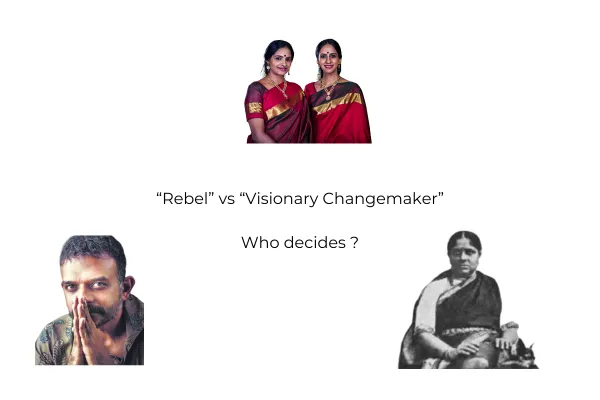
Rebel or Visionary ?
In Carnatic music circles, there is a concept called "Vidwat".
"Vidwat" in Carnatic music signifies a profound mastery and scholarly understanding of the art, blending technical skill with deep interpretative insight.
In terms of the audience, there are "Rasikas" and then there are the connoisseurs.
Rasikas and connoisseurs both deeply appreciate music but from different perspectives. Rasikas connect emotionally with the performance, reveling in the way music moves and transports them, often valuing the experience over technical precision.
Connoisseurs, on the other hand, have a keen eye (or ear) for the technicalities, structure, and execution of the music. They appreciate the finesse, historical context, and intellectual aspects of the performance, often possessing a detailed understanding of the art form's intricacies.
Where Rasikas enjoy the heart and soul of the music, connoisseurs appreciate the mind and technique behind it.
The average Rasika probably grew up with devotional music in the background of their childhood. Maybe even learned it for a few years.
They may have had music lovers at home and now are missing their homeland, and culture and music are emotions and memories for them.
They are RaGa and Bombay Jayshree fans.
They tear up during concerts. Music is a full-bodied experience for these folks.
And then there are connoisseurs.
The "Inner Circle".
For these people - the only music worth listening to is yesteryear stalwarts like Semmangudi, Ariyakudi, Chembai, Madurai Mani and maybe GNB and if they needed to pick a contemporary musician, Sanjay Subramaniam.
Because "Vidwat" = crudely put, someone who is a math genius. Who can do arithmetic and complex series on the fly as one is singing neravals (melodic phrases with rhythmic patterns).
It's cerebral. The "eating-Vendakkai-to-do-better-math" kind.
It's the Carnatic version of the protein pumping alpha male.
Because ability to do complex arithmetic and geometric progressions on the fly is sexy, the ultimate flex.
But "Bhakti" on the other hand is emotive, visceral, intuitive and feminine.
Being moved to tears to music, in modernspeak, is "simp".
It is "light" singing.
This suspicion and rejection and devaluing of the feminine, is after all, at the core of patriarchy.
Its the classic Knowledge vs Intuition paradox.
Knowledge is seen, therefore it can be trusted.
Intuition ? Well that has to be abolished as "witchcraft" because we cannot control what we cannot see.
Because Bhakti is intangible you see ?
You can learn to create or decode a musicians complex Neraval on a piece of paper and maybe recreate it, or at least know how they got there.
But when you have tears streaming down, and an experience of godliness - its full bodied.
No one can recreate that exact formula ! Which means the musicians that can create that for the audience (who were historically female) are powerful, you do not have power over what you cannot decode.
I would like to believe that this stereotyping based on gender has changed for a lot of people.
After all we are past the era where female musicians were known more for their Viruthams, Abhangs, Thukkadas and Bhajans (emotions-based) than their Neravals and Pallavis (arithmetic-based) singing prowess.
That perception has shifted today, and the average Rasika knows that.
But has it shifted perceptions in a big way in the inner circles of power ?
Take contemporary female percussionists, for instance. They are booked up for one month a year, during March, for women's day - the optics are, after all attractive, and they spend the rest of the year being rejected by artists, who refuse to perform when accompanied by female artists.
It is not a level playing field, and misogyny in Carnatic music is very real, and is not just historical.
Take religion for example - "Gyaanam" or intellectual understanding of God, has always traditionally been considered superior to "Bhakti" - which was a heart-based, emotive way to seek and attain God.
While Bhakti is free for all, Gyaanam has historically had gatekeepers.
While concert tickets are "free for all" listeners, Carnatic careers have gatekeepers.
History is replete with instances of the the intellectually superior ones gatekeeping access to God for the less educated and less erudite.
And instances how God comes down to those who seek him with simple purity of the heart, and the intellectuals are put in place.
Every year, as RaGa and other women sit down to perform with full Bhakti in the Thyagaraja Aradhana - sharing the stage with male musicians, so that the entire world can celebrate them both for their Bhakti as well as unparalleled Vidwat, let's not forget why they have seat at that table.
Until 1941, female artists were not allowed to share a stage with male artists at the annual Thyagaraja Aradhana, the most revered stage in Carnatic music.
Until Bangalore Nagarathnamma - a fiery activist, took it upon herself to rebuild the shrine to Saint Thyagaraja and in the process break the male bastion that the festival was reduced to.
She was debarred from performing Harikatha in the temple that she built with her own personal funds.
It took so many years of activism, shame, ridicule, isolation and name-calling before the change happened.
I wonder, would Nagarathnamma would have been perceived by today's musicians.
Would she have been accused of " willfully, and happily stomped over the sentiments of this community" by the male bastions of yester year ?
Would Nagarathnamma's activism bordered on anger, occasionally foraying into "vile and vituperative" territory or would she have had to be a demure and ladylike in her changemaking work, catering to the male egos masquerading as tradition ?
This current mudslinging match though ?
It offers big respite - because there is something so human and democratic about RaGa engaging in fiery debates and activism, sans decency, thus becoming the very people they claim to abhor.
There is nothing likeable about change - or changemaking or changemakers even, in the short term.
Changemaking is about being disliked by many people for long periods of time.
It's about resisting the urge to control your legacy while you are still alive.
About taking imperfect next steps for long periods of time and cede control of your legacy to those that come after you.
NOT your contemporaries.
And then, if you are on the right side of history , maybe being revered a generation or two later.
Status Quo custodianship on the other hand is so pristine and perfect.
Not an unkind word spoken, so politically correct, being liked by everyone, almost divine.
Its also controlling the narrative of your legacy, while you are still living.
It is an exercise in futility.
This event, in my view marks RaGa's entry - from Ivory towers to the real stage. I for one welcome this, wish them well and cannot wait to see what happens next.
What we offer
Our Areas Of Focus

Career, Entrepreneurship& Leadership

Sex, Relationships
& Parenthood

Eating, Movement &
Body Image

